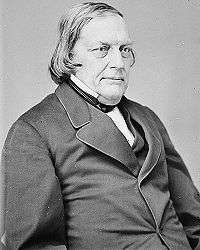Ira Harris
Ira Harris (May 31, 1802 – December 2, 1875) was an American jurist and senator from New York. He was also a friend of Abraham Lincoln.
Ira Harris | |
|---|---|
 | |
| United States senator from New York | |
| In office March 4, 1861 – March 3, 1867 | |
| Preceded by | William H. Seward |
| Succeeded by | Roscoe Conkling |
| 1st Chancellor of the University of Rochester | |
| In office 1850–1853 | |
| Succeeded by | W. Allen Wallis |
| Personal details | |
| Born | Ira Harris May 31, 1802 Charleston, New York |
| Died | December 2, 1875 (aged 73) Albany, New York |
| Political party | Whig, Republican |
| Profession | Lawyer, Politician, Judge, Professor |
Life
Harris grew up on a farm, and graduated from Union College in 1824. He then studied law in Albany and, in 1828, was admitted to the bar.
He was a Whig/Anti-Rent member of the New York State Assembly (Albany Co.) in 1845 and 1846. He was a delegate to the New York State Constitutional Convention of 1846 and a member of the New York State Senate (3rd D.) in 1847.
He was a justice of the New York Supreme Court (3rd D.) from 1847 to 1859 and was, ex officio, a judge of the New York Court of Appeals in 1850 and 1858.
U.S. Senate
In February 1861, Harris was elected a U.S. Senator from New York to succeed William H. Seward who did not seek re-election, but would be appointed U.S. Secretary of State by Abraham Lincoln. In the U.S. Senate, Harris served on the Committees on Foreign Relations, the Judiciary, and the Select Joint Committee on the Southern States. Although he supported the administration in the main, he did not fear to express his opposition to all measures, however popular at the time, that did not appear to him either wise or just. He visited Lincoln at the White House often and grew a friendship with him. He was also a good friend of his predecessor in the Senate, William H. Seward.
His son William Hamilton Harris (1838-1895) was a brevet lieutenant colonel in the Army Ordnance Department. His daughter Clara Harris and his stepson/future son-in-law Henry Rathbone were the Lincolns' guests at Ford's Theatre on April 14, 1865, when the president was shot and killed by John Wilkes Booth. Booth stabbed Rathbone in the arm when he tried to stop the assassin from escaping. Clara and Henry were married in 1867, but were also step siblings – Harris had remarried to Pauline Rathbone, Henry's mother.
Judge Harris was, for more than twenty years, a professor of equity, jurisprudence and practice in the Albany Law School and, during his senatorial term, delivered a course of lectures at the law school of Columbian University (now George Washington University), Washington, D.C.. In the Senate, he also served on the Joint Committee on Reconstruction which drafted the Fourteenth Amendment to the United States Constitution.
Harris was buried at the Albany Rural Cemetery with his first wife, Clarissa.
His grandson, Henry Riggs Rathbone, was a congressman from Illinois.
Notes
References
- United States Congress. "Ira Harris (id: H000242)". Biographical Directory of the United States Congress.. Includes Guide to Research Collections where his papers are located.
- The New York Civil List compiled by Franklin Benjamin Hough (pages 141, 147, 230f, 279 and 351; Weed, Parsons and Co., 1858)
- Court of Appeals judges
- Senator Ira Harris is a character in "Henry and Clara" (1994)(published by Ticknor & Fields) an historical fiction by Thomas Mallon. In reality and fiction he is the father of Clara Harris Rathbone and peculiarly the stepfather and father-in-law to Henry Reed Rathbone.
Attribution:

|title=(help)
External links
| New York State Senate | ||
|---|---|---|
| Preceded by John C. Wright |
New York State Senate Third District (Class 4) 1847 |
Succeeded by district abolished |
| U.S. Senate | ||
| Preceded by William H. Seward |
U.S. senator (Class 3) from New York 1861–1867 Served alongside: Preston King and Edwin D. Morgan |
Succeeded by Roscoe Conkling |
